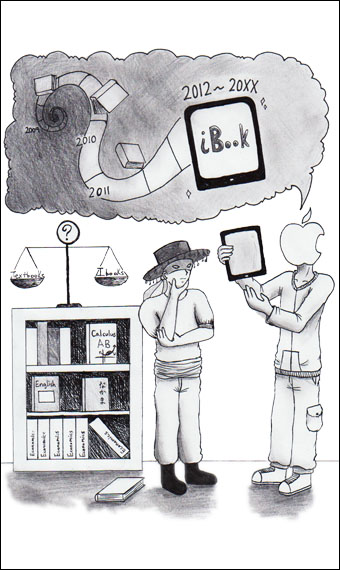
With the ever increasing presence of student tablets in the classroom, handheld digital technology is poised to revolutionize education. In recent years, high consumer demand for iPads, Kindles and Nooks has already devastated the book industry and textbooks are not far behind. On January 19, 2012, Apple introduced the iBooks 2 app, which features textbooks for download on the iPad. At Stanford School of Medicine, hardcover textbooks have already been replaced with iPads for their students.
Most students believe this technology is beneficial to the learning environment. One benefit is the physical ease.
Freshman Elaine Hsu says, “[It] makes it easier for students to get books and carry them around easily without the extra weight.”
In addition, digital textbooks offer capabilities that physical textbooks cannot.
Assistant Principal Jim Coe, who owns a Kindle and iPad 2 himself, recognizes their potential advantages. “The textbooks that will come [can] be easily updated… so you don’t have to worry about outdated textbooks, and also some of the graphics can be very dynamic. Rather than looking at a picture, you can have a movie, a simulation [or] a how to step by step guide.”
Senior Zhili Liang supports its usage in education. He says, “Not only is the information better organized, but it can have an interactive experience built in, which will facilitate learning more than just reading words from a textbook.”
iBooks for iPad heavily advertises its wide range of features including 3D and interactive diagrams in textbooks. Many teachers see this as an opportunity for improved learning.
Earth Science teacher Richard Whitmarsh says, “Earth science is all about physical processes. Animations and flash based and animated gifs bring physical processes to life. So if students had an iPad or some sort of graphic interface, they could play it and replay it until they understand it.”
However, not all may be as embracing of this change. Sophomore Kyler Niemann shares why some students might be hesitant. “A lot of people like the old fashioned book because there’s a ‘book feeling’ to it… It smells like a book and you can turn pages.”
Furthermore, digital technology comes with its fair share of problems.
Perhaps the greatest complication is the lack of textbooks available for download. Currently, iBooks for iPad has a catalog from three publishers. None of those textbooks are currently used at Aragon. However, more and more digital textbooks are becoming available.
Technology coordinator Jim Smith says Aragon’s first glimpse of this technology may not be a long way off. “The district’s looking at it. They might even pilot it next year. I would say in the next two to three years we’ll be adopting to some capacity digital textbooks.”
However, funding for such technology presents a large roadblock.
“You have to buy this hardware, and then once you’ve made [the] commitment, it’s a recurring cost to renew and replenish it [as well as address] technical issues and vandalism… To leverage it properly, you have to rethink the way a classroom would operate,” says Smith.
The district has already begun to look into these issues.
Coe says, “The technology committee, [which] has a representative from each high school, is looking at doing some research and probably setting up some pilots in the future. [Funding] is part of the study. Where will the money come from? Will we divert funding that normally goes to textbooks into electronic devices? All that has to be worked out.”
For now, many questions remain unanswered. Concerns about student liability have also been raised.
“If you lose a book, you have to pay, for example, $80, but if you lose the [tablet], it’s $600. How [administration] is going to do this is another thing that has to be decided on,” says Tech Support Specialist Malak Hojatnia.
Integration of the digital textbook at Aragon will be challenging. Yet as its issues are evaluated and addressed, this technology is likely to make its way into the classroom in the future.
“I think most kids would like it a lot, and eventually it will become normal for most schools to have like iPads [and tablets] for books and such,” says Niemann.
Special Education teacher Carl Pastore adds, “When it is time for it to happen, I’ll be on board with it.”




